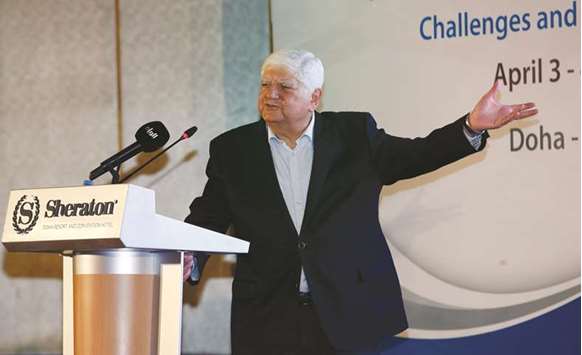Qatar, which is further “fortifying” its economy against the economic blockade that is entering 10th month today, yesterday said it had offered the UAE gas at very competitive terms, as it believed in the Gulf agreements and integration.
“We are going to fortify our economy more through the second National Development Strategy (NDS) 2017-22,” Dr Ibrahim Ibrahim, economic adviser to the Emiri Diwan, told the first international business conference organised by the Community College of Qatar (CCQ).
He made this remark to a specific query regarding what steps have the country taken to ward off the effects of economic blockade by the siege countries. In June last year, Saudi Arabia, the UAE, Bahrain and Egypt imposed economic blockade on Qatar.
Highlighting that Doha’s imports from the three (siege) Gulf Cooperation Council (GCC) countries was high at 50% to 60% of total; he said this was concentrated in food and beverages (F&B), construction materials and industries that are needed to support the country’s growth.
Stressing that Qatar believed in the GCC agreements to foster the unity and development among the member countries, he specifically said Doha’s decision to keep gas export prices to the UAE “extremely low” vouches for its commitment towards the GCC integration.
Since the blockade, Qatar has re-strategised its supply chain through imports from Oman, Turkey, Iran, India and China, and had also reoriented its maritime agreements.
Stressing that Qatar has learnt lessons from the blockade; Ibrahim said Doha has proactively taken steps towards achieving self-sufficiency, especially in the food sector, by giving subsidies but with certain conditions so as to avoid creating monopolies.
Qatar had last month unveiled its second five-year national development strategy, which focuses on building human and institutional capacities, developing entrepreneurial ecosystem and promoting research and development as part of efforts to achieve sustainable development and self-sufficiency.
Ibrahim said Qatar’s development path can be split into two stages with two distinct sets of objectives with the first stage being the implementation of Qatar energy development strategy and the second stage relating to the comprehensive development process.
“The energy development strategy aimed at maximising the yields of Qatar’s oil and gas reserves, and the optimal exploitation of these resources,” he said, adding the implementation of energy development strategy led to the growth of Qatar’s GDP from 2000 to 2011 (in real terms) at a high rate of 13%.
Qatar realised long ago, even before the collapse of oil and gas prices, that the energy development strategy was not comprehensive, thus necessitating the shift to renewable elements of production as well as human capital and technology to achieve the sustainable development, Ibrahim said.

Dr Ibrahim addresses Community College of Qatar international business symposium.



